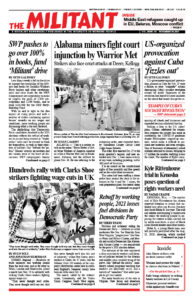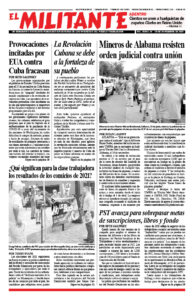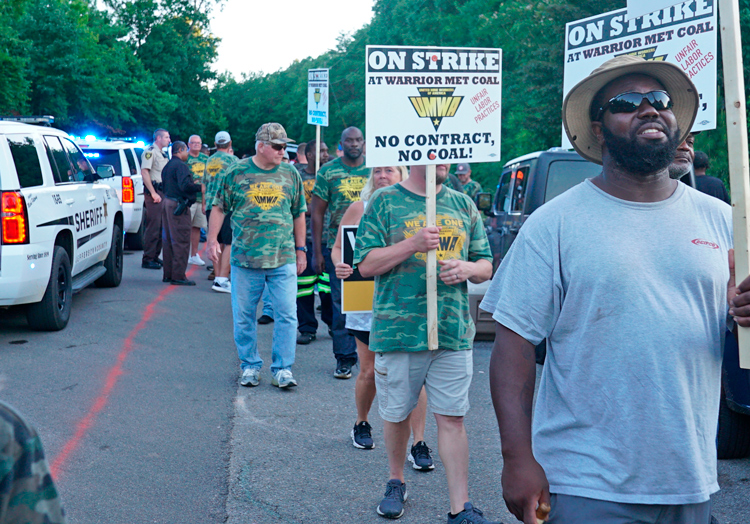ATLANTA — “This is a serious attack on the union,” Bryan Butler, a United Mine Workers of America member on strike at Warrior Met Coal in Brookwood, Alabama, told the Militant by phone Nov. 16. He was referring to the restraining order, now extended twice, by Tuscaloosa County Circuit Court Judge James Roberts.
The order, first enacted Oct. 27 at the mine operator’s request, and now extended until Dec. 5, bans union activity of any kind, including picketing, within 300 yards of the mines.
It is an assault on the constitutional rights of free assembly and free speech and on the entire labor movement.
The union had been staffing a dozen picket lines around the clock at the entrances to No. 4 and No. 7 mines, the coal preparation plant, the central shops and several railroad crossings since the strike started April 1.
“We’re having a rally tomorrow at Brookwood ballpark to hear what the union is planning in response to what the company and court have done,” said Butler, who has worked at the No. 4 mine for more than five years. While continuing to picket, he is working as a contractor at the nearby UMWA-organized Shoal Creek Mine. “I hope we have a rally in Montgomery to support the strike. We know Gov. Kay Ivey supports Warrior Met and other mine operators.”
The company got the order after organizing a violence-baiting campaign against the union, blaming miners for confronting scabs crossing the picket lines.
The company has been mining coal with scab labor at the No. 7 mine since early in the strike and has now started mining at No. 4, Butler said. Alabama state troopers provide regular escorts for the scabs driving or being bused into the mines.
The strike by 1,100 UMWA members began after Warrior Met refused to reverse massive concessions in wages and benefits made five years earlier, when previous owner Jim Walter Resources went bankrupt.
The UMWA is planning rallies Nov. 18 in New York, Boston, Denver, San Francisco, and Washington, D.C., to protest the company’s attacks on the union and its refusal to negotiate seriously. In New York the protest will take place outside the offices of BlackRock, a multibillion hedge fund that is the biggest owner of Warrior Met.
Miners are not alone in confronting court interference aimed at crippling a labor struggle today.
An Iowa judge issued a restraining order against striking United Auto Workers at John Deere’s plant in Davenport, Illinois, limiting pickets to four. Over 10,000 UAW workers are on strike at John Deere.
Douglas County Court Judge Timothy Burns also issued a temporary restraining order against Bakery, Confectionery, Tobacco Workers and Grain Millers members on strike at Kellogg’s plant in Omaha, Nebraska. Some 480 unionists are on strike there, part of 1,400 Kellogg’s workers who walked out nationwide.
The injunction prevents workers from “impeding movement in and out of the plant” and “picketing in large numbers.” The judge issued the order only hours after Kellogg’s filed a lawsuit against the local union alleging its members were “intimidating” strikebreakers. A hearing on the complaint is due Nov. 17.
Intervention by the courts had to be overcome during the rise of the mass movement that built the industrial unions in the 1930s. Bosses got court orders aimed at getting scabs into plants to run production and crush efforts to establish unions.
In the Toledo Auto-Lite strike, one of the labor battles in 1934 that helped kick off a strike wave that decade, bosses got a compliant judge to issue an order telling workers and their unemployed supporters to stop picketing. They put up effective picket lines of thousands of workers and the police couldn’t stop them.
Despite a court injunction and the mobilization of the National Guard, bosses were unable to break the sit-down strike at the General Motors plant in Flint, Michigan, in 1937. Workers occupying the plant refused to budge. Thousands of fellow unionists from different industries traveled to Flint and formed a huge cordon around the plant to defend those inside. GM bosses caved in and recognized the UAW.
By the end of the year nearly half a million other workers engaged in sit-down strikes establishing unions across many industries. Lessons of those struggles will be sought today by workers seeking to overcome the red tape and court orders bosses find it so easy to get.
Spread the word about the UMWA fight at Warrior Met! Send donations to UMWA 2021 Strike Fund at P.O. Box 513, Dumfries, VA 22026. Send messages of support to District 20, 21922 Hwy. 216 (Miners’ Memorial Parkway), McCalla, AL 35111, Email umwadistrict20@bellsouth.net.


